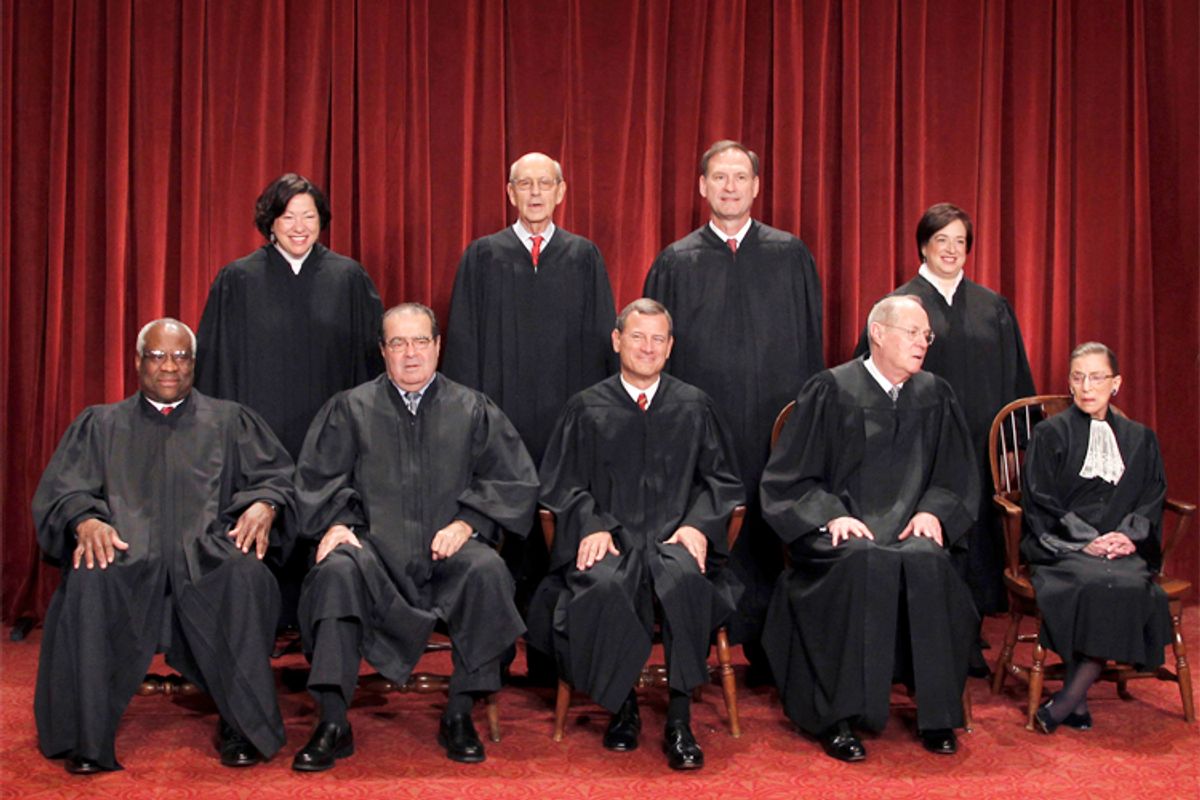Well, looks like the Moops didn’t invade Spain after all.
The Supreme Court’s opinion in King v. Burwell just came down, and by a 6-3 majority the high court unambiguously sided with the Obama administration’s argument that Congress did not intend to destroy insurance markets on a state-by-state basis when it wrote the Affordable Care Act. It’s an affirmation of the ACA’s intent and purpose, and a much-deserved rejection of the breathtaking cynicism and flagrant dishonesty that motivated the legal reasoning behind the lawsuit.
The plaintiffs in the case argued that a single four-word phrase in the law’s text meant that the government could not pay out health insurance subsidies to people in the 34 states that use the federal insurance marketplace. Chief Justice John Roberts, writing for the majority, allowed that this interpretation was plausible if the language is read in isolation, but “the context and structure of the Act compel us to depart from what would otherwise be the most natural reading of the pertinent statutory phrase.”
When you look at the whole law, Roberts wrote, it is unmistakably clear that Congress intended to provide subsidies to all states. Moreover, he wrote that the plaintiffs' contention that Congress actually intended to withhold subsidies was implausible “because it would destabilize the individual insurance market in any State with a Federal Exchange, and likely create the very ‘death spirals’ that Congress designed the Act to avoid.”
Which brings us to the big finish:
Congress passed the Affordable Care Act to improve health insurance markets, not to destroy them. If at all possible, we must interpret the Act in a way that is consistent with the former, and avoids the latter. Section 36B can fairly be read consistent with what we see as Congress’s plan, and that is the reading we adopt.
In other words: the card may say “Moops,” but the correct answer is quite obviously “Moors.”
So what does this mean? First and foremost, it means that millions of people are no longer at risk of having their health insurance taken away for no good reason, and it means that health insurance markets in the majority of states are no longer staring down mass disruption and chaos. Less significantly, the Obama administration and Democrats in Congress can take a victory lap. And even less significant than that, those of us in the political writing business can now wallow in despair that we wasted so many irreplaceable minutes of our lives gaming out the ramifications of this long-shot scheme to destroy the president’s healthcare law. All those hot takes, all for naught.
For Republicans, the reaction should be one of complete and utter relief. They’ll complain and moan to keep up appearances with the conservative activists and to remain consistent with their full-throated, bad-faith support for the King plaintiffs, but this is a boon for the GOP. If the court had ruled in the other direction, Republicans in Congress would be in the position of having to move and move quickly to do something to mitigate the damage. They would have had to find unity of purpose within their own ranks to move forward on healthcare policy. That’s something they’ve tried and failed to do for over half a decade now, and there was little reason to believe that they were on the cusp of getting their act together. The stage was set for vicious intra-party fight that would have, in all likelihood, left congressional Republicans in their all-too-familiar position of deadlocked incompetence. Now they can continue banging away on Obamacare repeal and punt responsibility for crafting healthcare policy to their 2016 presidential candidates.
By upholding the ACA’s subsidies and obviating the crisis that Republicans and conservatives were eager to create, John Roberts and his concurring justices relieved the GOP of the burden of governing, and for that, they should be grateful.

Shares